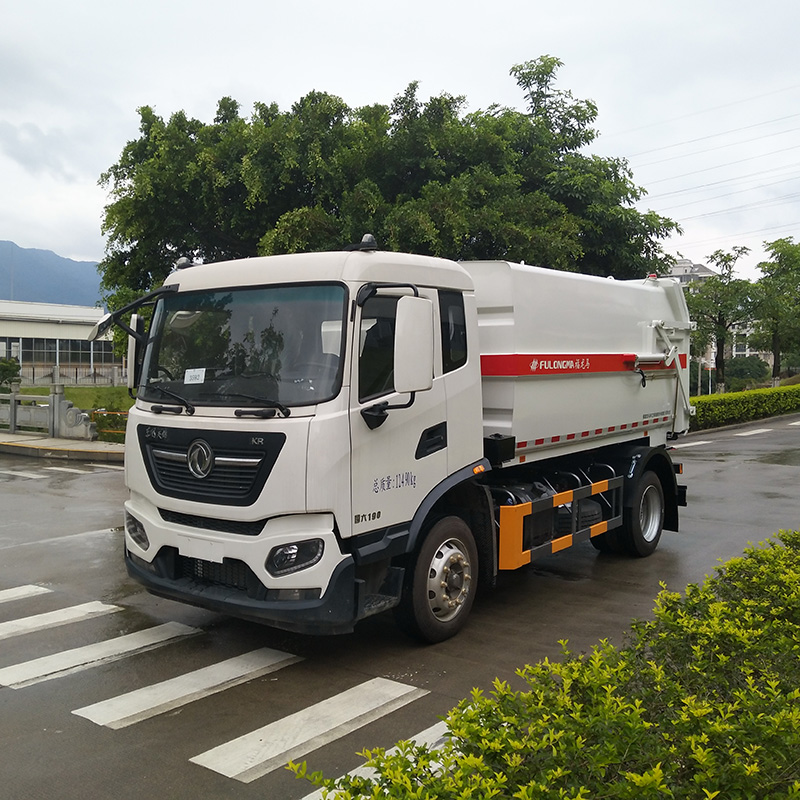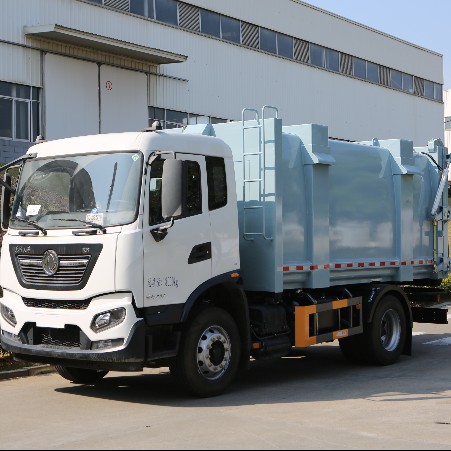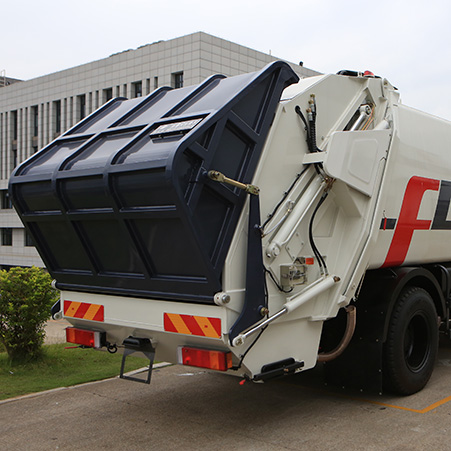Waste management has evolved significantly over the centuries. In ancient civilizations, waste was often discarded in open pits or rivers, leading to unsanitary living conditions and the spread of diseases. As societies grew more complex, so did their waste management practices.
The 20th century saw significant advancements in waste management technology. The introduction of hydraulic systems allowed for the compaction of waste, increasing the capacity of garbage trucks and reducing the number of trips required to disposal sites. Automated side loaders and rear loaders made the collection process faster and safer for workers. GPS technology and route optimization software enhanced efficiency, reducing fuel consumption and emissions. These innovations set the stage for the latest breakthrough in waste management: the docking-type garbage truck.

What is a Docking-type Garbage Truck?
A docking-type garbage truck is a specialized vehicle designed to dock with waste containers, enabling automated waste collection and disposal. These trucks are equipped with advanced technology that allows them to connect with standardized waste bins, lift them, and empty their contents into the truck’s compactor. The entire process is automated, requiring minimal human intervention. This innovation not only speeds up the waste collection process but also ensures that waste is handled safely and hygienically.
Key Features and Components
Docking-type garbage trucks come with a host of advanced features and components that set them apart from traditional models:
- Automated Docking System: This system allows the truck to align and connect with waste containers accurately, ensuring efficient and seamless waste transfer.
- Hydraulic Lifting Mechanism: The hydraulic system lifts and empties the waste containers into the truck’s compactor with minimal effort.
- Advanced Compaction Technology: Modern compaction mechanisms reduce the volume of waste, increasing the truck’s capacity and reducing the number of trips to disposal sites.
- Smart Technology Integration: Real-time data tracking, route optimization, and remote monitoring enhance operational efficiency and reduce environmental impact.
- Noise Reduction Features: These trucks are designed to operate quietly, minimizing noise pollution in urban areas.
Comparison with Traditional Garbage Trucks
Traditional garbage trucks rely heavily on manual labor for loading and unloading waste. Workers must lift and empty waste bins into the truck, which can be physically demanding and pose a risk of injury. In contrast, docking-type garbage trucks automate this process, reducing the need for manual intervention and enhancing safety. Additionally, traditional trucks often require more trips to disposal sites due to limited capacity, whereas docking-type trucks’ advanced compaction technology allows for greater efficiency and fewer trips.

Advantages of Docking-type Garbage Trucks
Docking-type garbage trucks offer several key advantages over traditional models:
- Efficiency: Automated loading and unloading reduce the time required for waste collection, allowing for faster and more efficient operations.
- Environmental Benefits: Fewer trips to disposal sites result in lower fuel consumption and reduced emissions, making these trucks more environmentally friendly.
- Cost-effectiveness: While the initial investment in docking-type trucks may be higher, the long-term savings in labor costs, fuel, and maintenance make them a cost-effective solution.
- Safety: Automation minimizes the risk of worker injuries, enhancing overall safety in waste collection operations.
- Hygiene: The automated process reduces direct contact with waste, promoting better hygiene and sanitation.
Technological Innovations
Docking-type garbage trucks are at the forefront of technological innovation in waste management. The integration of smart technology, such as GPS tracking and route optimization software, allows for more efficient waste collection routes, reducing fuel consumption and emissions. Advanced compaction technology increases the truck’s capacity, reducing the frequency of trips to disposal sites. Additionally, noise reduction features make these trucks ideal for urban environments, where noise pollution is a concern.

The Future of Docking-type Garbage Trucks
The future of docking-type garbage trucks looks promising, with several exciting developments on the horizon. Further integration with smart city infrastructure will allow for even more efficient waste management systems. For instance, sensors on waste bins can notify the docking-type trucks when they are full, optimizing collection routes and schedules. Moreover, advancements in electric vehicle technology could lead to the development of electric docking-type garbage trucks, further reducing their environmental impact.
As cities continue to grow and the demand for efficient waste management solutions increases, docking-type garbage trucks will play a crucial role in ensuring cleaner, more sustainable urban environments.
Conclusion
The introduction of docking-type garbage trucks marks a significant milestone in the evolution of waste management technology. These innovative vehicles offer numerous advantages over traditional garbage trucks, including enhanced efficiency, environmental benefits, cost-effectiveness, safety, and hygiene. As technology advances, docking-type garbage trucks are poised to become a key component of smart, sustainable cities. Embracing these innovations will improve waste collection operations and contribute to a cleaner and healthier planet.






